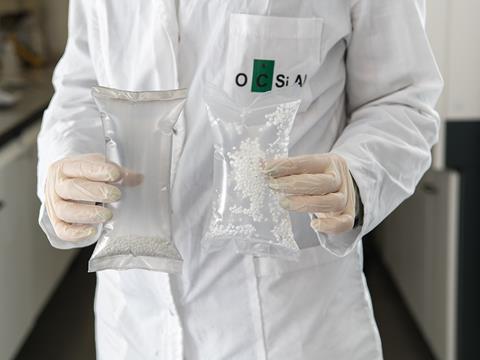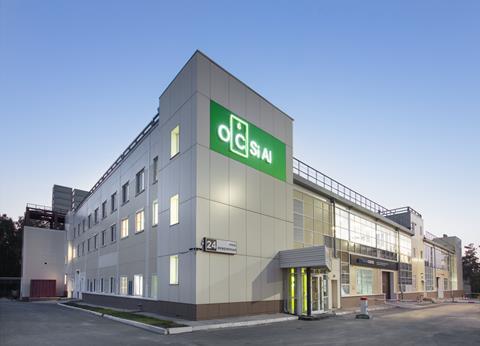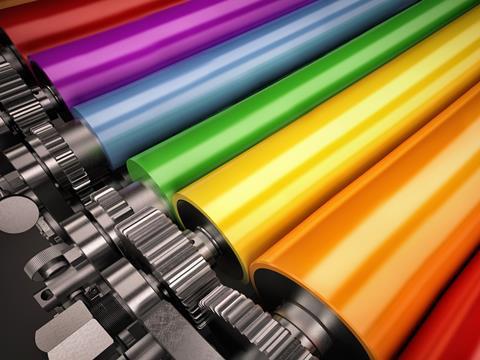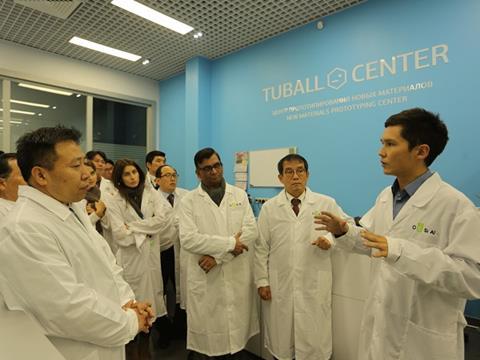
TUBALL™ nanotubes can dramatically improve the properties of countless materials used in manufacturing, and OCSiAl is taking the lead in developing numerous dispersion technologies that allow customers to integrate it into their products without changes in manufacturing technology or formulation. Christoph Siara, sales and marketing director, tells Libby White about the huge potential of TUBALL™, the first graphene nanotubes available for commercial application across a wide range of industries, including packaging.
Graphene nanotubes possess a range of astonishing qualities: they are 100 times stronger than steel, have excellent conductivity, and therefore anti-static properties, and thermal stability up to 1000°C. Another key advantage is that desired properties can be achieved with ultra-low loadings of the additive - hundreds or thousands of times lower than other widely used conductive additives and starting from concentrations of just 0.01 per cent.
Fast progress
Founded in Novosibirsk, a remote location in Siberia and a stronghold of Russian science, the OCSiAl startup has grown into a Luxembourg based global business. Mr Siara goes back to the beginning. “OCSiAl was founded in 2009 and the purpose of its creation was to generate technology that allowed us to viably and economically produce graphene nanotubes under the brand name TUBALL™,” he says. “The idea fuelling the founders forward was that each innovation which has impacted mankind has been backed up by an evolution in materials - for example smartphones were enabled by new materials.
“Until 2014 there was no industrial production capacity for graphene nanotubes. After 2014 it was produced at around 100 kilos per year. Today it has reached approximately 11 tonnes, of which 10 tonnes are produced by OCSiAl. We are increasing this to 50 tonnes annually and have commissioned 250 tonnes in total to come in to play in 2022.”

Potential for application
To facilitate the effective incorporation of TUBALL™ into materials, OCSiAl has developed a line of easy-to-use pre-dispersed concentrates, masterbatches and suspensions that are compatible with a wide variety of industry-standard formulations.
“TUBALL™ can be used to nanoaugment and improve characteristics of nearly 70 per cent of all materials in existence,” says Mr Siara. “As a consequence, our marketplace is extremely large. Our focus today is on plastics, energy, rubbers, and composites. Taking a closer look at the packaging industry, we have focused in particular on adding properties and value to blow films, printing rollers, and conductivity in thermoplastics.”
OCSiAl has already developed for example solutions for thermoplastics, LDPE and PE for the blown film industry and is seeing positive results from trials in the US and Asia. “We are now launching the product in Europe,” adds Mr Siara.
Just 0.01% of TUBALL™ nanotubes has allowed a European manufacturer to obtain transparent polyethylene film with permanent and uniform anti-static properties. Moreover, the nanotubes have significantly improved the strength characteristics of the film and they have also shown promise in increasing the thermal stability.
Anti-static bags, FIBC liners, static shielding bags and films, protective tapes and conductive films – all of these have been designed to protect certain goods and products from static electricity. Conventional permanent anti-static additives, such as carbon black, have always led to the degradation of mechanical properties and a darkening effect, and migrating anti-static additives result in non-permanent conductivity at various humidity levels. These problems can now be avoided with graphene nanotubes, which offer the best value proposition in terms of price per property, making them the additive of choice for the industry.
Added value for industrial rollers
Another example of application to spotlight is printing rollers. TUBALL™ nanotubes provide stable anti-static properties and prolonged cycle life.
Stable and homogeneous resistivity of 10^5–10^8 Ω/sq, without carbon migration, improved mechanical properties and life-cycle – this is what TUBALL™ graphene nanotubes can provide, even at ultra-low concentrations. Nanotube-enhanced urethane and silicone rollers for printing, transferring and rotation functions significantly boost productivity.
Rolls accumulate triboelectric charge when they move against cylinders, wool, paper, or any other insulator. This charge can then cause paper jams and unwanted changes in tinting, toner density, reduction in the efficiency and the overall quality of the production and printing process. These problems can be vastly reduced by modifying the composition of a normally non-conductive polymer roller so that it has anti-static or ESD properties. Up to now, the most common anti-static additives to satisfy the requirements have been carbon black or special mineral/organic fillers. However, the high loadings of around 20 per cent by weight required in the total compound lead to degradation of mechanical properties and a reduction in the life-cycle, as well as problems with non-permanent and non-uniform conductivity and migration of carbon black to the surface, which is a particular problem in itself to printing applications.

Thanks to their extraordinary physical and chemical properties, TUBALL™ graphene nanotubes are an ideal conductive additive in various types of rollers used in printing devices and industrial applications involving pigments, organic solvents and other aggressive environments. These nanotubes facilitate permanent and homogeneous conductivity without a negative impact on the mechanical properties of the original materials; in some cases, the nanotubes can even improve them. Solutions containing TUBALL™ are available for a wide range of polymers.
The product line of TUBALL MATRIX concentrates that is now available for various standard formulations of industrial rollers meets conductivity standards without compromising mechanical properties. In fact, the potential of TUBALL™ nanotubes to improve both static and dynamic mechanical properties and thus prolong the life-cycle of industrial rollers is attracting great interest from the industry.
Mr Siara sums up, “TUBALL™ gives abrasion resistance, higher mechanical strength in a printing roll, and increased speed which gains capacity - crucial factors for the printing industry.”
OCSiAl is a game changer - overcoming the absence of technology for the mass production of graphene nanotubes, also known as single wall carbon nanotubes, opening up the vast possibilities of enhanced materials. The challenge, given the vast range of transformative applications, may be to work out which areas in packaging and print represent the most viable starting points for large scale usage.
This content was sponsored by OCSiAl.













